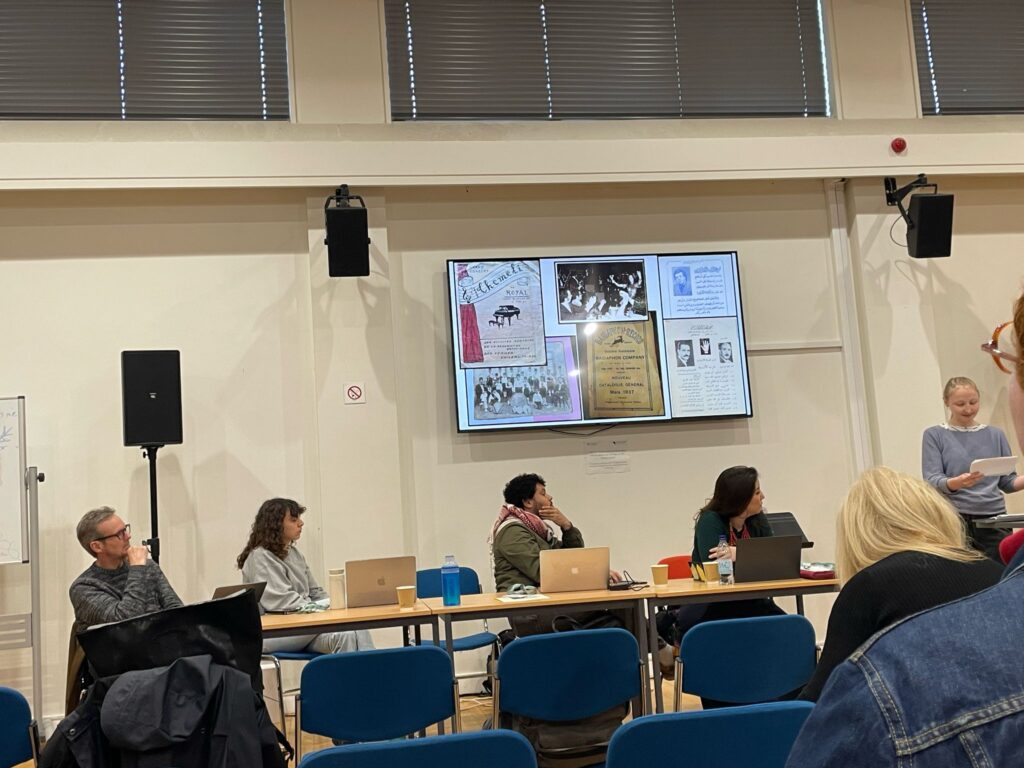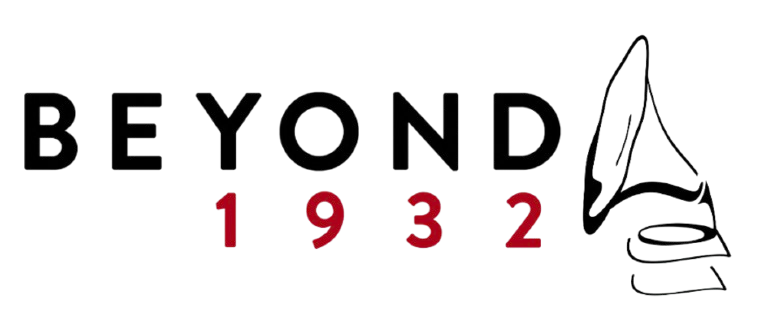
British Forum for Ethnomusicology Annual Conference 2025 : Arab futures and Palestine statements.
The BFE Annual Conference was conducted in bright sunshine in the dazzlingly glamorous and flower-bedecked environment of the Cambridge ‘Backs’. The walk from the Music Department to the Old Divinity School on Saturday was a highlight for me, even though I was deep in conversation with old friends most of the time. But I can honestly say I had never seen Cambridge looking so beautiful. The programme was excellent, the keynotes powerful, the papers uniformly strong. It was also good to see the BFE conference recovering some of its mojo after the miserable pandemic years. The energy it imparts is important to the state of the field, and everything it touches these days.
The ‘Beyond 1932’ group was active and conspicuous throughout. Its panel on Arabfuturism (‘Beyond 1932’… to the future? Arabfuturism, sound arts, and the archive today’, see abstract below) attracted a good crowd, and had the considerable benefit of resident artist Kareem Samara’s presence. The ‘Beyond 1932’ roundtables over the last year or so seems to be an ongoing conversation increasingly knitting together all of our individual interests. We are finding more and more levels of overlap, engagement, mutual interest and friendly provocation. Feedback repeatedly reinforces this impression. The field of ethnomusicology has lately become more open to interdisciplinary conversation, less concerned with its own identity than it once perhaps was. My feeling is the ‘Beyond 1932’ project models something on the sharp end of this process.
Panelists Sophie Frankford, Rim Irscheid, Yara Salahiddeen and Kareem Samara each began their talks with the following words: “It is difficult to proceed in a panel on the subject of Arab futures however without first noting that the British Forum for Ethnomusicology has yet to condemn the ongoing Israeli annihilation of 70,000 Palestinians in Occupied Gaza and the illegal theft of Palestinian land in the Occupied West Bank. There is a phrase in Arabic, silence is approval and, in this case, as BFE members, we are complicit in silence. I call upon the BFE to condemn the genocide, uphold the Palestinian right to resist illegal occupation enshrined in international law, and to hold a referendum to join the Boycott, Divestment and Sanctions movement. In this way, we would be joining other academic bodies which have taken similar action such as the American Anthropological Association and BRISMES, the British Society for Middle East Studies”. Salahiddeen later made a similar statement at the AGM.
Later the same day in a panel on crisis and care, Julia Byl discussed efforts within SEM to condemn the assault on Gaza, and the push-back on them. Recourse to arguments about the fragility of our scholarly community was not an acceptable way of silencing pro-Palestinian voices, she noted. And in his keynote at the end of the day, Luis-Manuel Garcia-Mispireta, put a similar point equally strongly. At the panels, at the AGM, and at the keynote, these uncoordinated comments were met with – in some cases, prolonged – applause. The BFE promises to discuss the matter, proposing a study day.
The point was made that the BFE can’t make a statement and take a side on every global conflict. This neglects an important, indeed, to me, decisive issue. Putting aside the moral repugnance we might feel at the deaths of 70,000, largely women and children, at the hands of one of the most advanced, western-backed, military machines in the world, the issue is one of basic democratic structures – to protest, to voice support for the powerless, to call out the complicity of others and recognize our own – in our academic field. In Germany and in the USA, the discussion concerning Palestine we have been able to have in the relative freedom of our institutions and universties would be prohibited.
That prohibition is, as things stand in the USA at the moment, backed by legal and financial sanctions, as well as the threat of police violence. We should surely all be able to agree that *this is abhorrent. And that a stand is needed against the creeping McCarthyism of our times. If not now, when? With reference to the pointless surrender of academic authority, integrity and duties of care at his own institution in recent months, Rashid Khalidi posed the question ‘Does Columbia still merit the name of a university?’ (https://www.theguardian.com/commentisfree/2025/mar/25/does-columbia-merit-the-name-of-university). If ‘care’ matters to us, it’s a question we should all be asking of ourselves.
Martin Stokes
PANEL ABSTRACT
‘Beyond 1932’… to the future? Arabfuturism, sound arts, and the archive today.
The ‘archival turn’ has engaged scholars, performers and archivists in MENA (Middle East and North Africa) for some time; the release of the celebrated 1932 Cairo Congress for Arab Music sound recordings (by Robert Lachmann), and the recent publication of Bernard Moussali’s archival research on the Congress (Lambert 2024) has added a significant new element, since the Congress refracted and shaped ideas central to the comparative musicology of the time, and today’s ethnomusicology. It has also gained urgency in an interdisciplinary field of discussion that seeks to clarify the political, creative and aesthetic stakes of archival projects (Hartman 2008, Mbembe 2002). How do archives frame ‘futures’, though – and what are the political, creative and aesthetic stakes of such framings? What happens when those futures are Arab futures? And what happens to them in relation to the field of Arabofuturism (Collective Manuela 2023)? Members of the ‘Beyond 1932’ group discuss the matter with Palestinian sound artist Kareem Samara, from the perspectives of cultural history (Yara Salahiddeen), anthropology (Sophie Frankford) and curation (Rim Irscheid).
The Beyond 1932 project has been underway since 2023 at King’s College London (https://1932muscon.kcl.ac.uk) – an attempt to imagine new interdisciplinary modes of knowledge production around archives in what has, in recent years, become a busy field.
- Hartman, Saidiya 2008 ‘Venus in Two Acts’
- Mbembe, Achille 2002 ‘The Power of the Archive’
- Moussali, Bernard (ed. Jean Lambert) 2024 ‘Le Congrès du Caire de 1932’, Geuthner, Paris.
- Collectif Manuela 2023 Arabfuturs, IMA, Paris.
Participants:
Sophie FRANKFORD (KCL)
Rim IRSCHEID (KCL)
Yara SALAHIDDEEN (KCL)
Kareem SAMARA (Independent Sound Artist, London)
Martin STOKES (KCL)

